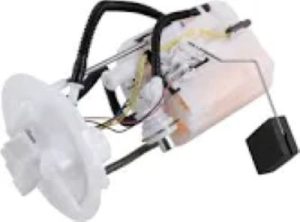In fact, a problem with a fuel pump can lead to the loss of power for your vehicle. The fuel pump simply moves fuel from the tank to the engine at the proper amount of pressure. When it does, it may not deliver enough fuel to keep up with the demands of the engine, particularly during acceleration and high-speed driving. This leads to a lean running engine, where there is not enough fuel in the air-fuel mixture and may result in power loss, In a 2019 report from the National Institute for Automotive Service Excellence (ASE), it found that approximately 10% of problems with power loss in vehicles was fuel-pump related.
Loss of power when accelerating or driving uphill starts to occur (a classic failing fuel pump symptom) More fuel is required by the engine during these circumstances and if the pump cannot relay it, then the car will stall to maintain bestride which gives hesitation or jerky acceleration. In the worst instances, the car might simply stop. This ultimately leads to loss of power in the engine due to a lack of pressure. In most cases, the fuel pump must be able to maintain a high pressure, usually around 40 to 70 psi (pounds per square inch), for it not to cause issues.
Yet another factor that could lead to power reduction connected to the pump is over heating. The car may shut off if a fuel pump overheats, causing the engine to lose access to gasoline. With time, continuous overheating damages can become irreversible. A consequence of driving a car with a low fuel tank is the increased risk of an overheated fuel pump. This is caused by the fuel itself, which cools the pump, while there is little or no cooling for it in near-empty tanks. Last year, AAA identified the need to keep the fuel tank full at least one quarter of a summer to prevent premature fuel pump failure.

Fuel pump failure and contaminated fuel can also cause loss of muscle. Fuel TankDebris or water in the fuel can clog the fuel filter,Fuel Pump or perhaps more seriously, cause damage to the pump and force it to work harder delivering you your petrol. This additional burden diminishes its effectiveness and the actual pump will eventually fail altogether. Regular maintenance such as replacing the fuel filter every 30,000 to 40,000 miles is also reported by Consumer Reports in 2021 to extend the life ofthe fuel pump and prevent power loss issues.
Power without control, according to legendary automotive expert Carroll Shelby, was nothing. No category of vehicle part drives home this point more effectively than the fuel pump, without control over how gasoline is administered few engines maintain any consistent level of power. When a fuel pump fails, the balance is disturbed and the engine suffers immediate consequences.
In a nut shell, very low fuel to the engine will cause severe power loss because of the under capacity from faulty fuel pump. Regular maintenance followed by a diagnoseWHAT™ will catch small issues before they become larger engine problems. To learn how to maintain or upgrade your fuel pump, head over to Fuel Pump.